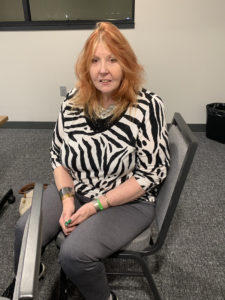by Erin Beck, writing for the “When All Are Counted” Project
It’s expensive to be poor, as the saying goes. And state and local regulations in West Virginia can make it extremely difficult for people with disabilities to get the boost they need to connect in their communities.
The Americans with Disabilities Act (ADA) prohibits discrimination against people with disabilities in several areas, including employment, transportation, public accommodations, communications and access to state and local government programs and services.
But in practice, some mandates aren’t enforced, and regulations still often don’t meet the needs of people with disabilities.
And when communities and officials don’t meet the needs of people with disabilities, it’s not like those people are erased from society. They may become isolated, instead.
Because of the lack of West Virginia health data for marginalized groups, including people with disabilities, researchers have been conducting “When All Are Counted” Project focus groups throughout the state. As I’ve worked on the communications staff for this project, I’ve learned of ways the state makes it harder for people who have disabilities by essentially mandating them to financially struggle and ways state and local governments fail to create accessible public accommodations.

Mary Terry
Mary Terry, who lives in Inwood in Berkeley County, wants to make a difference in her area. She brings milkshakes and sundaes to her best friend’s mother, who is in a nursing home, because her friend’s mother won’t eat solid food.
Mary, 60, drove three hours for a focus group held at The Schoolhouse Hotel in White Sulphur Springs in March.
Inside the abandoned schoolhouse, every room is designed for people with disabilities. Remodeled now and elegantly designed, it is the state’s first all-accessible hotel.
“It was beautiful,” she said. “It was nice. Too bad I couldn’t stay there or eat.”

(George “Mack” McIntire, who is on the advisory board for the project and running for mayor in White Sulphur Springs, has worked as the city Americans with Disabilities Act compliance officer to attempt to make the rest of the town more accessible and make life easier for people with disabilities.)
Following the focus group, Mary agreed to an interview. She speaks with anger about the injustice people with disabilities face in accessing expensive care like prescriptions and mobility devices. She said she has to be low-income to get the help she needs.
“It’s a way of discriminating against the poor and disabled,” she said.
She is also used to traveling and calling long distances for health care. Although she has Medicaid, she couldn’t find a local provider who would supply her with glasses so she had to travel to Maryland. And because of low Medicaid reimbursement rates, she gets dental care from students in Morgantown “because Medicaid doesn’t even touch what a dentist costs.” Because she has to stay below income limits for Medicaid, she has to drive a 1997 pick-up valued at about $600.
According to DHHR, one person can make up to $23,766 for Medicaid, but other factors are considered.
She has macular degeneration glaucoma, a blood disorder, and several other health problems.
Some of her disabilities come from being a survivor of domestic violence. She had a broken wrist, a broken hand, a torn rotator cuff, and a head injury. She’s had surgeries on her knee, her ankle and her wrist, as well as her neck, where she now has metal plates and screws.
She is losing her sight from her diabetes and has to travel to another state for treatment. She has schizoaffective bipolar disorder, PTSD, and anxiety. She also has a slow-growing cancer, blood lymphoma, which she’s had since 1987. It isn’t expected to kill her due to better medication being developed over time, although she was expected to die in her late 30s. Without that medication, she’d have a stroke. And she takes about 20 additional prescriptions.
Even though she is low-income, making about $10,000 a year from part-time work, as well as receiving another about $12,000 annually in disability benefits, she worries she will lose coverage when Medicaid begins removing people from the rolls now that the pandemic-related pause on Medicaid renewal requirements is ending. She expects to lose coverage in June, and Medicaid pays for her prescriptions now. She knows of some healthcare providers which will provide it for cheaper based on a sliding scale. But she knows some people with disabilities don’t know about that option.
She also worries Social Security benefits will be taken away in June, when she’s due for a renewal, because she was unable to work at all following the domestic violence when she first received the benefits.
She works as a relocation director for a realty firm, getting business for other realtors. She can’t do sales. She isn’t mobile enough to go house to house for showings.
Her husband put all their assets in his name, so she also lost everything after experiencing domestic violence and the divorce.
Originally from Washington, D.C., Mary has moved around a good bit. To get by, and to help, she lives with her daughter now, who moved to the Eastern Panhandle for a job, “so I’m very blessed,” she said. Despite the hardships she faces, her family brings her joy, and she loves the scenery in West Virginia, just not the disability benefits system. She helps with the three kids and one grandkid, and the rent.
McIntire, of White Sulphur Springs, is an unofficial spokesman who works to raise awareness of The Schoolhouse Hotel. He’s been a friend and advisor to the owner, Charlie Hammerman.
After being named the city’s ADA compliance officer, he’s made recommendations to improve access to places like local businesses for people with disabilities in the community, but he’s run into resistance. City Council tends to believe making the city more accommodating will be expensive, but it just takes action, he said. And many people don’t know that businesses that apply for grants for ADA compliance improvement are eligible for tax write-offs.
“When you’re handicapped and in a wheelchair, it’s just really hard to get people to take you seriously."
George "Mack" McIntire
He also participated in the focus group. Five years ago, he fell and broke six vertebrae. Following surgery, he now has metal rods, brackets, screws and a cadaver bone, he said.
Despite hurdles he’s faced, he said he has a “little more oomph behind me now. And I’m going to be able to get some things done.” He made a friend who was named by President Joe Biden to the ACCESS board, an independent federal agency that provides leadership in accessible design under the ADA and other laws.
The Schoolhouse Hotel is unique among hotels. Allison Bungard, whose son Andrew has cerebral palsy and is primarily nonverbal, has had trouble with them. Allison is also on the “When All Are Counted” advisory board.

Allison Bungard
Her family wanted to purchase a shower chair for her son to use at hotels that often lack them. Her son is on a state waiver program, the intellectual/developmental disabilities (IDD) waiver, which comes with Medicaid insurance, that assists people with home workers and equipment, but there is a list of uncovered items. A shower chair that cost more than $1,000 is on that list. The chair was going to be about $2,100. Bungard and her husband were willing to pay the extra $1,000. But the vendor required a denial from Medicaid, and she couldn’t get a denial from Medicaid for an uncovered item.
“The right hand’s not talking to the left here,” she said.
A lawyer who has the ability to work part-time, she had to be persistent and point out that the denial for an uncovered item was impossible to obtain. The process took several months.
“Not every kid is going to have a parent who does that, or a parent who has the time to do that,” she said.
She also worries about how her son, who has intellectual disabilities, could fight for his rights someday like she did.
She also explained multiple ways that when public areas aren’t accessible for people with disabilities, that harms their ability to fully participate in society.
“You hear a lot of people talk about ramps,” she said. “Physical disabilities involve a whole lot more than just ramps.”
Even hospitals and doctors’ offices lack changing stations for bigger kids for parents to change “medical briefs,” similar to diapers. Neither does the Capitol. Most schools don’t. Large entertainment venues lack them. So, people like her son have to sit in soiled clothing. Other states are more accommodating, she said.
Cities don’t enforce snow removal, so she can’t push the wheelchair on sidewalks. Therapy at school is focused on completing curriculum, not functioning in the community.
According to a preliminary analysis of focus groups that researchers have reported to the project team, people with disabilities report a need for rentable ADA equipment (wheelchairs, scooters) to be used in downtown areas and accessible by well-maintained sidewalks, bike paths, and river-walk areas.
She worries about missing important appointments because of a lack of parking. Many mothers of kids with disabilities she knows take psychiatric medications, she said.
Andrew could bring so much joy to others in the community if he was able to fully participate.
“My son laughs and he has a laugh that can make the entire room laugh,” Allison said. “They’re dealing with medical professionals who sometimes believe they have lives that aren’t worth living. That’s a pretty pervasive attitude among many medical professionals, that kids born with certain medical problems, they’re better off dead.”
Erin Cox works at the Covenant House location for the Charleston-based free clinic, Health Right. She works as a social worker and behavior health counselor, or what she likes to refer to as an “ally.” She sees many people with disabilities who experience financial struggles due to state regulations and wait times.

Erin Cox
“The system,” she said, is stacked against them. She said it “almost perpetuates the cycle of poverty.”
“It takes a lot of work,” she said. One patient applied eight months ago, she said.
“He’s done everything he’s supposed to do,” she said. “He’s turned in all the paperwork. And it’s been eight months, and he still has not seen any kind of disability.”
The income guidelines can be a “barricade,” she said. She sees people who want to work and didn’t go to college, perhaps because of a lack of a “strong upbringing,” who will then take a low-paying job then be ineligible for benefits. That problem is common, she said.
Cox noted that it’s more likely for people with disabilities to be in poverty by nature of their disability. That’s for both Social Security benefits and Medicaid.
Transportation to doctor evaluations to prove their disabilities make them unable to work may be inaccessible. People with mental illness may also have a hard time holding a job, she said.
“I do what I can on my end,” she said. “Telling them the paperwork they need, faxing it. I’m like the middleman. There are just so many steps that are required.”
Signing people up for food stamps can be hard as well because many people who are low income still don’t qualify. Covenant House does have a food pantry.
When people apply for nutrition benefits, they have to prove income, utilities, and rent. They have to do a DHHR phone interview. “Ironically enough a lot of them can’t even afford a phone, so they do that phone interview with me,” Erin said. She’s seen some receive as little as $25 in food stamps a month, even though they’re low income. She said the state doesn’t take inflation of food costs into account, or food deserts.
She also works with medical assistants who are constantly working to get Medicaid to approve the purchase of mobility devices for people with disabilities. That’s a problem even for people who aren’t in poverty.
Through her work as a behavioral health counselor at Health Right, she tries to give people motivation to complete the process. She also works to help people take care of themselves by staying sober and not becoming hopeless while they wait for months for help. She said she helps people “fight for their rights.” But some people do end up using drugs and experience other mental health problems while they wait despondently.
“A lot of people fall through the cracks,” she said.
Note: According to DHHR, “Medicaid does not discriminate on the basis of disability in admission to or access to its programs or in its operations, services or activities. If you have questions or complaints or if you want to talk about whether you have a disability according to the Americans with Disabilities Act (ADA), you may contact the State ADA Coordinator at: WV Department of Administration, Building 1, Room E-119, 1900 Kanawha Blvd., East, Charleston, WV 25305, or call (304) 558-0628, extension 57004.”

Erin Beck, MPH, is a writer, poet, journalist and native West Virginian who writes for the “When All Are Counted” Project. Her writing, which often focuses on health disparities, social inequities, civil rights, and resistance and reform, has appeared in the Charleston Gazette, the state’s Goldenseal magazine and multiple other West Virginia publications. You can follow her on Facebook and Twitter.



0 Comments